- Home
- Joanne Harris
A Cat, a Hat, and a Piece of String
A Cat, a Hat, and a Piece of String Read online
About the Book
Stories are like Russian dolls; open them up, and in each one you’ll find another story.
Conjured from a wickedly imaginative pen, here is a new collection of short stories that showcases Joanne Harris’s exceptional talent as a teller of tales, a spinner of yarns. Sensuous, mischievous, uproarious and wry, these are tales that combine the everyday with the unexpected; wild fantasy with bittersweet reality.
Come to the house where it is Christmas all year round; meet the ghost who lives on a Twitter timeline; be spooked by a newborn baby created with sugar, spice and lashings of cake. Worry for a young girl in the Congo who rides the rapids to earn a crust of bread; and spy on Norse gods battling each other for survival in modern Manhattan. In her first short-story collection since Jigs & Reels, let Joanne Harris ensnare and delight you with the variety and inventiveness of her storytelling.
Contents
Cover
About the Book
Title Page
Dedication
Introduction
River Song
Faith and Hope Fly South
There’s No Such Place as Bedford Falls
Would You Like to Reconnect?
Rainy Days and Mondays
Dryad
Harry Stone and the 24-Hour Church of Elvis
The Ghosts of Christmas Present
Wildfire in Manhattan
Cookie
Ghosts in the Machine
Dee Eye Why
Muse
The Game
Faith and Hope Get Even
Road Song
Acknowledgements
About the Author
Also by Joanne Harris
Copyright
To Chris
whose stories always draw blood
Introduction
An interviewer once asked me this question: If you were to be stranded on a desert island, what three items would you take?
I gave this frivolous answer: A cat, a hat and a piece of string. Partly because I liked the jaunty, careless bounce of the phrase, and partly because each item has many potential uses, on its own or separately, which makes my choice more than the sum of its parts.
I’d bring the cat for company. The hat for shelter from the sun. The piece of string has multiple purposes, including to amuse the cat, or to keep the hat on in a high wind. There’s also a scenario in which I use the hat and the piece of string to make a simple fish-trap (presumably to feed the cat); or a less appealing one in which I strangle the cat with the piece of string and cook it for lunch, using the hat as a makeshift tureen. (To be fair, I can’t imagine myself ever wanting to eat a cat, but who knows what might happen if you were stranded for long enough on a desert island?) It occurred to me that I could probably think up a hundred similar stories featuring just those three items.
The stories in this collection are a little like that too. Though seemingly unconnected at first, you’ll find they are linked in all kinds of ways to each other and to my novels. Some take place in locations you may recognize; others feature characters with whom you may be familiar. Some stand alone – for the present, at least – which does not mean that they always will. Stories are often so much more than the sum of their individual parts; to me, they exist like unfinished maps to as-yet-undiscovered worlds; waiting for someone to pencil in the connections as they find them.
As I said in Jigs & Reels, short stories do not always come easily to me. Sometimes they drift like flotsam to the shores of that desert island; at other times I bring them home from my travels around the world; or sometimes they rattle inside my head for months – and sometimes years – on end, like coins trapped inside a vacuum cleaner, waiting for me to release them.
In any case, I hope that these may take you a little further into that unexplored territory. Maybe you’ll meet some old friends – as I hope you’ll find some new ones. Don’t forget your cat and your hat – and, with a long enough piece of string, you’ll always be sure to find the way home.
River Song
Stories are like Russian dolls: open them up, and in each one you’ll find another story. This particular story was written when I was in the Congo with Médecins Sans Frontières. Why I was there in the first place is a story in itself, but while I was in Brazzaville I met a gang of small boys who had devised an ingenious (and perilous) means of earning a living. They would gather by the river under the veranda of one of the city’s few surviving restaurants and, for a coin or a handful of scraps, would entertain the diners by leaping into the rapids at the river’s most dangerous point and riding the current downstream. These children – none of them older than ten years old – would risk their lives dozens of times a day, often for nothing more than a chicken bone or a piece of bread. What’s more, they seemed to enjoy it.
WELL, THERE’S ALWAYS the river. That’s what Maman Jeanne says, with that look old people get when they’re talking about something you can’t possibly understand, like how an aeroplane stays in the air, or why the Good Lord made the tsetse fly. It’s her answer to everything; complaints, questions, tears. Well, there’s always the river, she says. The Congo river is always there.
I should know: I’ve watched it all my life. I know its moods; like a fierce dog that will sometimes play, but goes for the throat if you take the game too far. I know the fishing spots and the best places to swim; the rapids and the shallows; the islets and the sands and where they shot the last hippo, years ago. To hear them talk, you’d think everyone in Brazzaville was there that day – if so, that old hippo should be right there in the Bible, next to the miracle of the foufou and the fishes. Still, says Maman Jeanne, fishermen and hunters are born to lie.
Maybe it’s the river makes them do it.
It’s true that stories collect here. Like the water hyacinth, they float downriver from the north, dividing and flowering as they go. The story of the Three Sorcerers, or the Eagle Boy, or the Devil-Fish, so huge it can snap a hippo’s spine, or swallow a crocodile in a single gulp. That, at least, is true; I have a devil-fish tooth to prove it, traded (for a cigarette and half a stick of chewing gum) from a boy on one of the barges. It’s longer than my finger, and I wear it round my neck on a piece of wire. Maman Jeanne says I shouldn’t; there’s bad magic in a devil-fish tooth, and anyway, it’s not right for a ten-year-old girl to be hanging around those river barges.
If she was my mother, says Maman Jeanne, she would teach me to cook and sew and work my hair into little plaits and cornrows to catch myself a man. That’s the catch for you, girl, she says, not some nasty old devil-fish that you couldn’t eat even if you could pull it in. But I can look after myself, and I don’t have to do what Maman Jeanne tells me. Besides, like she says, people may come and go, but the river is always there.
There are four of us here, work-working the rapids. Monkey, Catfish, Hollywood Boy and me. Of course those aren’t our real names. But names are secret things, full of power. They call me Ngok – the crocodile – because I’m such a good swimmer. And swimming, of course, is what we do.
Right at the edge of our patch, there’s a place called Les Rapides. It’s a big place, all white, with a balcony looking out over the water. Before the war a lot of people came here, but now it’s never more than a quarter full: businessmen in their grey square-shouldered suits, or pretty ladies with dyed hair and flouncy dresses, soldiers, officials, even the occasional mendele – white men here for business, I suppose – it’s been a long time since any actual tourists came here. They come to eat, of course – trois-pièces with pili-pili and fried bananas; baked squash with black rice and peanut sauce; crocodile with foufou and beans.
It makes me di
zzy even to think about so much food; and there are tomatoes swimming in oil, and riverfish stew and saka-saka and fresh crusty white bread and hot-fried chicken and manioc and peas. They come to eat – of course they do – but they also come because of the river, because of the rapids. From here you can see right across for miles and miles, right into Kinshasa where the fires burn across the water and the river is a wild thing, prancing and rolling from boulder to boulder and hurling up great gouts of spray. Not as wild as Hippo Island and the giant yellowgrey jumble of broken water beyond, but wild enough, and it sounds like—
Like elephants crossing, says Maman Jeanne. Big brown elephants with feet like palm trunks. Of course I’ve never seen an elephant, but in the city zoo there’s a skull the size of a lorry cab, all chalk and honeycomb, one splintery tusk lolling from the toothless mouth.
Like Sunday morning, says Monkey; like cathedral voices; like dancing; like drums.
Like helicopters, says Catfish, when he says anything at all. Like mortars and shells and the washboard clatter of gunfire. Or the noise, says Hollywood Boy, of a radio between stations, that eerie, dead sound of rushing and whispering, scratching and stirring.
The river has a song for everyone, says Maman Jeanne; and no song is ever the same. That’s why they really come: not for the food, or the view or the shady veranda under the mango trees, but for the river, the sound and the swell and the surge of the river song. I know; and the others are the same. Even Catfish, who is fourteen and thinks he knows so much more than the rest of us. There’s more to our business than just business.
Which is not to say we are not professionals. Some people carve wood for a living; some turn to the army; some work the markets, or the cabs, or the side of the road. We work the river. More precisely, we work the rapids.
Our rapids are a highway for all kinds of trade. Fish trappers, stonebreakers, washerwomen, thieves. I know them all: boys with nets, old men in pirogues, scavengers with poles and sacks. Downriver is the shallow place where Maman Jeanne takes her washing. It’s a good swimming hole, too, for babies and women, but we don’t swim there. Oh no. We swim further up, from Les Rapides to the stonebreakers’ flats, and we don’t let anyone else work our strip. We earned that strip, Monkey, Catfish, Hollywood Boy and me. Especially me; partly because I’m the youngest, but mostly because I’m a girl. And, as Maman Jeanne says, girls don’t dare, girls don’t bare, and most of all, girls never, ever ride the rapids.
There are three corridors dividing the rapids on our side of the river. One – we call it the Slide – is close to the bank, sweeping and doglegging breathlessly between the rocks. The second – the Swallow – is much further out, and to reach it you have to swim outwards in a wide curve, skirting a sinkhole and a bad drop over some big boulders. You have to be strong – most of all you have to be quick, because no one can swim against the current; all you can hope for is to use the current to swing you far enough out to reach the safety of the corridor. But if you miss by even an arm’s length, then the current whips you – with a shake-shake-snap like a dog with a rat – right into the sinkhole. If you’re lucky and it spits you out again, the ride ends with a quick scuttle down a bumpy little rockslide and no harm done – except maybe for a skinned backside and the sting of laughter from the riverbank. It happens sometimes, though never to me. And sometimes – well. Better not to think of that. The good God harvests his crop, says Maman Jeanne, and all your tears will never bring back a single seed of it.
The third ride is almost a legend. Far, far beyond the others – perhaps three times the distance between the Swallow and the bank – it can only be reached from the Swallow itself. Halfway down to the stonebreakers’ flats, the current divides over a big pink rock, which we call the Turtle. The Turtle’s shell is round, and on one side there’s a good smooth ride into the mainstream. On the other, there are underwater rocks – ankle-biters, we call them – but if you’re fast – and lucky – I reckon you could break away from the Swallow and ride the river’s great round shoulder into the Deep.
I’ve never done it, though I’ve charted its path, using river junk and clumps of hyacinth, and I’m almost sure I could. No one else has, as far as I know; Monkey says there are crocodiles, but he’s just scared. With his crooked leg he doesn’t swim as well as the rest of us, and never even rides the Swallow. But he has a rubber ring from a truck tyre, and fits it just as neat as a bird on a nest, so Catfish lets him come. I don’t think that’s fair – if it had been me, you bet he wouldn’t have allowed it – but Catfish is the General, and we have to do what he says. I don’t always like that – it’s especially hard being a Lieutenant when even Monkey’s a Colonel – but Catfish is pretty fair in most other things, and besides, who else would have let a girl join in the first place?
And so, every day between nine and five, we meet up under the balcony at Les Rapides, and we practise our moves. Easy ones, to warm up, with Monkey on his rubber ring and the rest of us bobbing along, yelling. Then comes the trick-tricky stuff – high dives, star-jumps, crocodile, with all of us in a long unbroken chain. We stop mid-morning for a rest. A snack, too, if we can get it; perhaps a dough ball or a slice of cold manioc scrounged from Maman Jeanne. Sometimes there are small green mangoes on the trees over the veranda, and we throw sticks at them until one falls down. After twelve, though, the company starts to arrive, and we have to be good, or risk losing our business.
Like I said, we work the river. More precisely, we work the people: and if you ask me, anyone who can afford to spend a couple of thousand CFRs on a meal is fair game. It isn’t begging – we’d never beg – but we can’t stop them watching us, can we? And if sometimes they drop a coin or two, or a chicken bone, or a piece of bread, then where’s the harm in that? Maman Jeanne doesn’t like it, but she turns a blind eye. It’s a wage like any other, after all, and it’s more fun than breaking rocks.
I was born somewhere upriver. That was before the war – I can’t remember the name of the place, or anything much about it, except that there was a house with palm thatch, and chickens running around it, and my mother used to carry me in a sling on her back, and there was a smell – not city smells but a forest smell – of wet mud and trees and rushes and steam from the manioc pots. Maybe that’s why I ended up on Hippo Island; it’s a fair long walk into town each day, but it feels good to be out of the city at night and to hear the river song as I go to sleep, with its choir of frogs and peepers.
No one else goes there much, except the fishermen. It’s supposed to be bad magic. Papa Plaisance says it’s the spirit of that last hippo, waiting for his chance to be avenged. Maman Jeanne says it’s because things happened there during the fighting. She won’t say much, but I can tell they were bad, because normally Maman Jeanne can talk the legs off a centipede. Still, that was a long, long time ago, three years at least, and the island is a good quiet place now. But most people keep away, and there are stories of ghosts and sorcerers. I’ve never seen any. Papa Plaisance hasn’t, either, and he comes every day in his pirogue. I have seen some pretty good catfish, though; and I’m glad the others stay away. Besides, I like being on my own.
Maman Jeanne has a shack near the other bank. She lives there with Maman Kim, her daughter, and Petite Blanche, her granddaughter. Maman Kim’s husband used to live here, but doesn’t any more. There’s a story behind it, but that’s man–woman bizness, as Maman Jeanne says, and doesn’t interest me much. Papa Plaisance has a shack, too, with a vegetable patch and a workshop under the big mango tree. Papa Plaisance is Catfish’s uncle. He makes pirogues, or used to, before the war came, beautiful slim pirogues that sliced through the water without a sound. He’s the one who taught me how to ride the current and how to paddle from the stern to keep the little boat from tipping over. He goes out a long way, right into the rapids, and sets his traps among the ankle-biters. Sometimes I have to help him; but it’s dull work compared with riding the rapids, and he never pays me anyway, so I sneak past him when I can, and make my
way alone upriver.
Today I got to Les Rapides early, an hour after daybreak. The others weren’t there yet, and I sat on the bank and waited, chewing on a piece of bitter bamboo shoot and watching the river for devil-fish. There was no one else around, except for an old man with a pirogue, and a few birds flying low over the brown water. I’d been there for an hour before Monkey turned up with his rubber ring, and by then I’d already gathered that something was wrong. I’d have known it even without the way Monkey looked at me, all sideways and sly-fashion, with that little smile that means bad news for someone not him. He’s always been jealous of me, I know. Perhaps because I’m a better swimmer; perhaps because my legs are long and straight, while he has to walk short and twisty-style on his crooked foot.
‘Where the others, Monkey?’ I said.
‘Coming soon,’ he told me. ‘Papa Plaisance call us round. Give us dough balls for breakfast.’
Well, that was a surprise, for a start. Old Papa never gives out food for free. I wondered what he wanted, and why he’d asked my friends to eat, but let me go to Les Rapides alone.
‘Papa say you wasting time,’ said Monkey, bringing out the remains of his dough ball and beginning to eat it. ‘He says there’s money to make on the river.’
‘What, fishing with him? I leave that to the ones who don’t swim so well.’
Monkey’s eyes narrowed. ‘Well,’ he said, ‘Papa say he don’t want you hanging around here any more. He tell Catfish. You work for him now. No more Rapids.’
I could hardly believe it. ‘Papa Plaisance, he’s not my family,’ I said. ‘He has no right to decide what I do. Just because Catfish’s uncle says so, doesn’t mean I have to do his work for free.’
‘He tell Catfish,’ repeated Monkey stubbornly. ‘I tell you.’
‘But this is my business,’ I said, hearing the silly little shake in my voice.

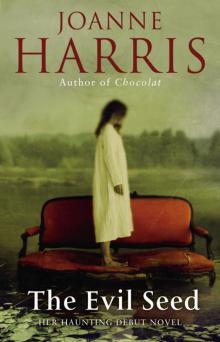 The Evil Seed
The Evil Seed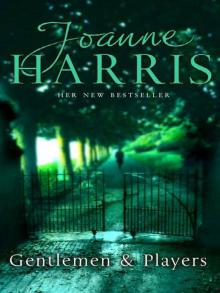 Gentlemen and Players
Gentlemen and Players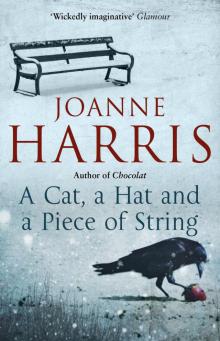 A Cat, a Hat, and a Piece of String
A Cat, a Hat, and a Piece of String Different Class
Different Class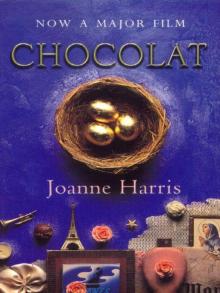 Chocolat
Chocolat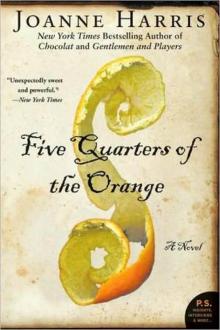 Five Quarters of the Orange: A Novel
Five Quarters of the Orange: A Novel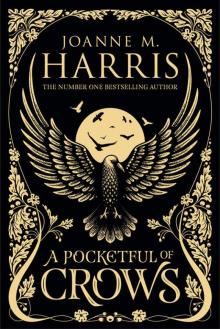 A Pocketful of Crows
A Pocketful of Crows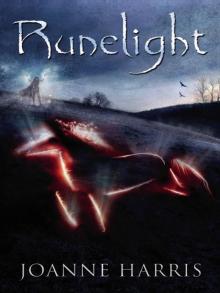 Runelight
Runelight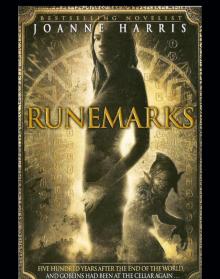 Runemarks
Runemarks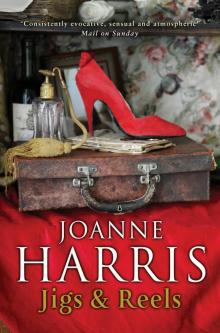 Jigs & Reels: Stories
Jigs & Reels: Stories Sleep, Pale Sister
Sleep, Pale Sister Holy Fools
Holy Fools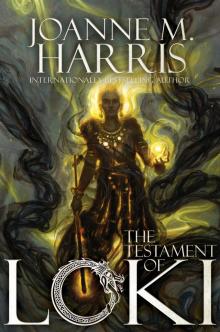 The Testament of Loki
The Testament of Loki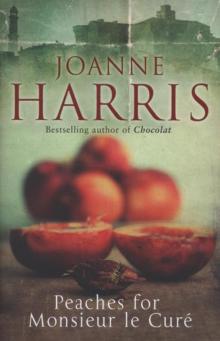 Peaches for Monsieur Le Curé
Peaches for Monsieur Le Curé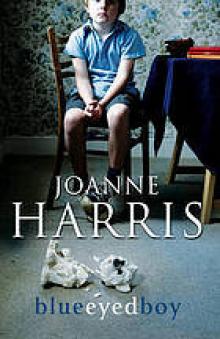 Blueeyedboy
Blueeyedboy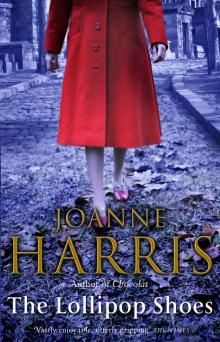 The Lollipop Shoes
The Lollipop Shoes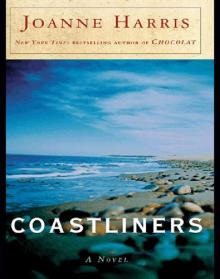 Coastliners
Coastliners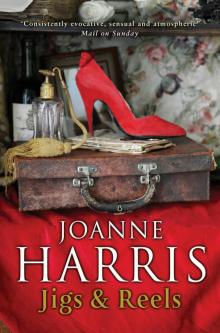 Jigs & Reels
Jigs & Reels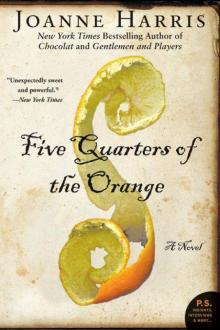 Five Quarters of the Orange
Five Quarters of the Orange